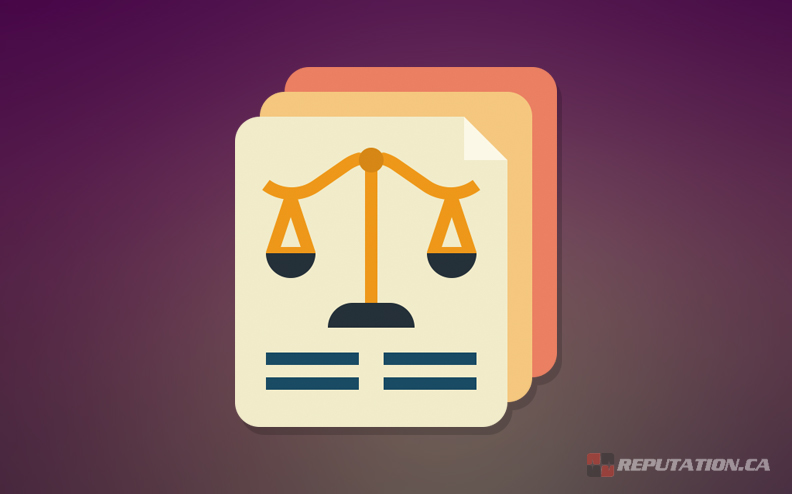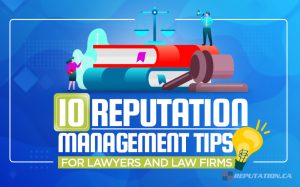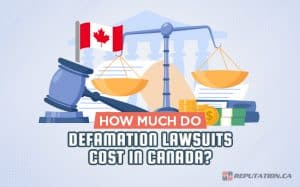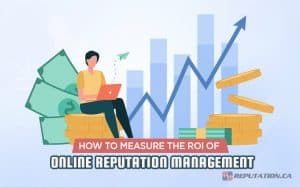Operating a business in a world like ours, where there’s such a thing as a legal system, means being exposed to and having to deal with that legal system. As an incorporated entity or another form of business, you’re exposed to everything from employee discrimination lawsuits to class actions on behalf of customers. Individuals, too, are exposed to the legal system.
In the past, before the advent of the internet, it wasn’t all that difficult to hide whether or not your company has been involved in legal action. If someone wanted to know, they would have to identify the jurisdiction, find the office of legal records, and submit a request – a process that could take months, and had a reasonable chance of missing something even if it existed.
With the internet in play, it’s significantly easier to find that kind of information. Not only can anyone simply Google search your company name and find news articles about you, but even many legal databases are open to the public. Not to mention all the second-tier sources, like YouTube content creators making videos about your legal actions.
The smaller your business or personal reputation is, the harder it is to hide legal action. A huge company like Disney or Nike has the search engine presence to overwhelm smaller sites, even if those smaller sites are government or legal system sites that technically have more authority.
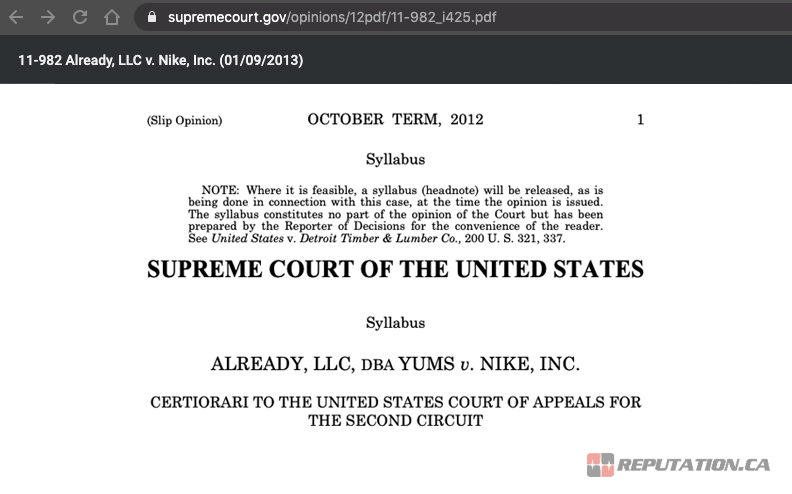
Of course, there’s also an element of obscurity through frivolity involved; everyone knows and expects that huge companies have been through the legal onslaught, and a simple search revealing that fact doesn’t much matter.
A small business or an individual, though, might not be able to out-rank those kinds of search results. If someone searches for your company name, you want your business website to come up first, not “Business Name Class Action Lawsuit”. It’s very difficult to build a small business website up to the point where it can out-rank a court system or legal site, especially since those sites tend to have more clout.
If you’ve never been involved in legal action, you might not consider this a problem. If you have, though, you’ll recognize that it can hurt your business. Often, it doesn’t matter whether you were the defendant or the plaintiff, or whether you won or lost; potential customers searching for your company name will see that you’ve been involved in legal action, and that can hurt their perception of you or your brand.
So, whether you were defending yourself against a frivolous lawsuit from a sovereign citizen, or you were caught discriminating against people in your hiring practices and were held liable for it, you’ll probably want to address the issue of search results that showcase your legal cases over and above your actual brand website.
There are essentially four ways you can handle this issue.
- Request that Google removes the offending search results.
- Request that the site hosting the results removes the page.
- Getting a legal expungement.
- Use reputation management to out-weight the search results with your own.
So, let’s discuss each of them!
1. Google Legal Removal Requests
Google offers two different ways you can request that content be removed from their search engine. We’ll link to both of them, but with fair warning: they probably won’t work.
1. The first option is the “Removing Content from Google” form, found here. This form allows you to report content on a Google property such as Blogger, YouTube, Google Ads, or the Play Store. If that content is found in violation of a policy, Google will remove it.
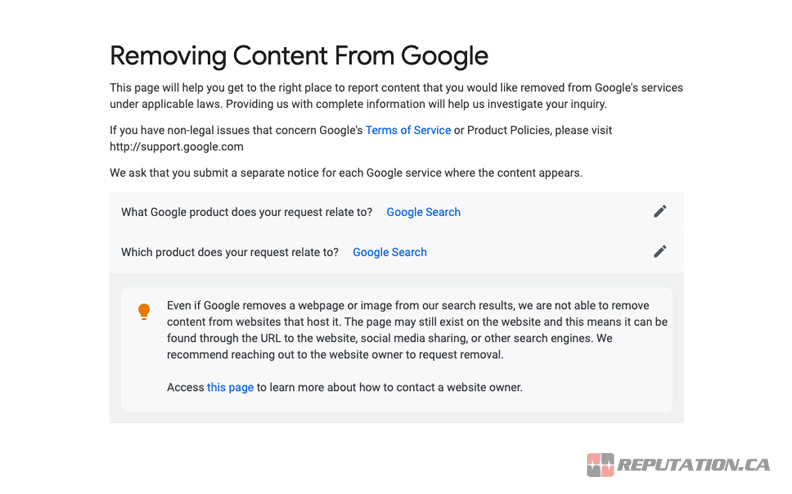
Unfortunately, this isn’t going to serve your purpose. This form is primarily meant to remove content that is scamming people, serving malware, or is otherwise harmful. If the source of the content has been removed but it’s still listed in search, this is also a way to get it removed. They will also remove personal private information that was not shared with consent, but then, legal case information is public information. Unfortunately, it doesn’t fall into any of these categories.
2. The second form they offer is the “Remove Content for Legal Reasons” form, found here. This system is an extension of the previous system and allows you to request the removal of information that violates their policies or that has been legally removed. If you, for example, go through the court process to get a record expunged, you can then request that Google remove it on the basis that it is no longer factual and is doing harm to your business by spreading invalid information to your customers.
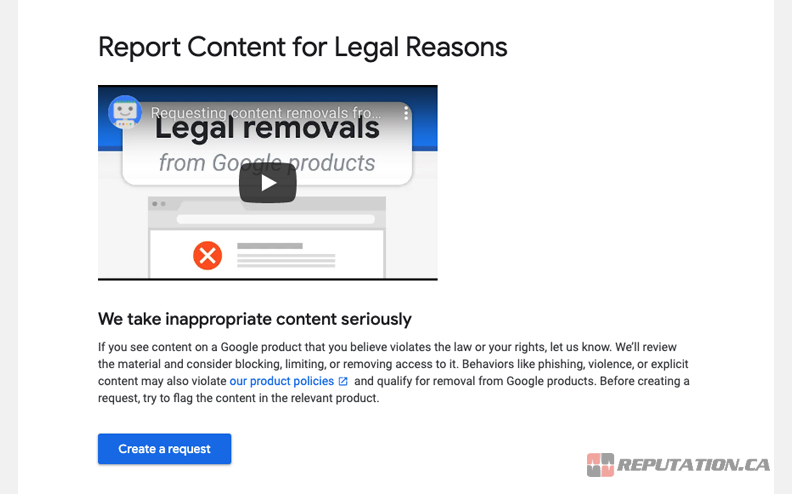
If you’re considering this method, of course, you need to go to court to get that record expunged, and that creates another court record and can be even worse for you if the appeal is denied. Since the information in these court cases is not private, and is not slanderous or defamatory, neither the courts nor Google has a good reason to remove it.
Incidentally, be wary of sites like this one. This is a site on sites.google.com with forms styled to look similar to Google’s submission forms, but it is not an official Google page. You can see it if you scroll to the bottom of the form: “This content is neither created nor endorsed by Google.”. Sites.google.com is a user-accessible page builder where anyone can make a site, and unfortunately in this case is used to make this third-party company look more official to people who aren’t careful.
While the company may be able to help you remove legal records, they will likely tell you the same things we are here; if you don’t have legal standing to have a record expunged, you won’t be able to do much. The difference is, we’ve got the information here on our blog for free, while they’ll charge a fee to tell you about it.
2. Removing Content from the Source
The second option is something similar to, for example, removing bad reviews from a site like Yelp or Trustpilot. Sites hosting court information about you will typically fall into three categories.
1. The first category is legal record-keeping sites, like CanLII (the Canadian Legal Information Institute) or PACER (the United States Public Access to Court Electronic Records system). These sites are part of the legal system of the country, and will not remove a record unless ordered by a judge. This runs into the same problem as the above; namely, that there’s no good reason in 99% of cases for that information to be removed. You can try to request it, but that request will universally be denied.
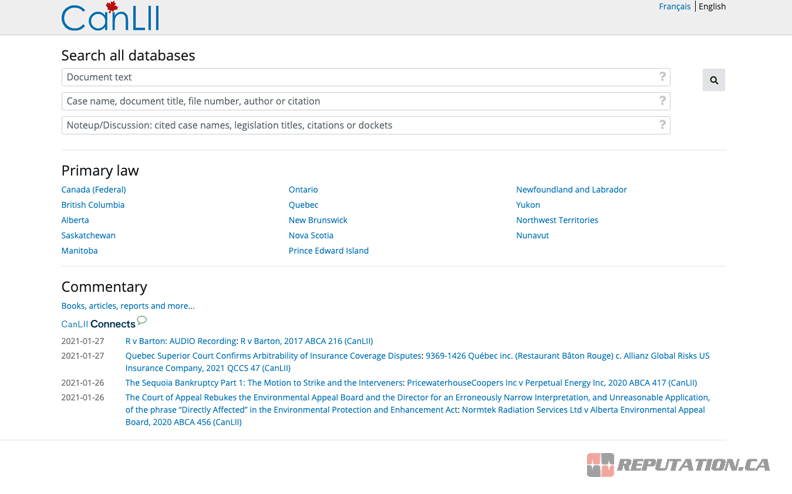
2. The second category are second-tier sites that aggregate information from the first category and display it, usually as part of a service to sell background checks. These sites might comply with a legal request to remove information, but often not; after all, they aren’t even necessarily hosting the information, they’re drawing it from the legal databases upon request. They might not technically have any data to remove.
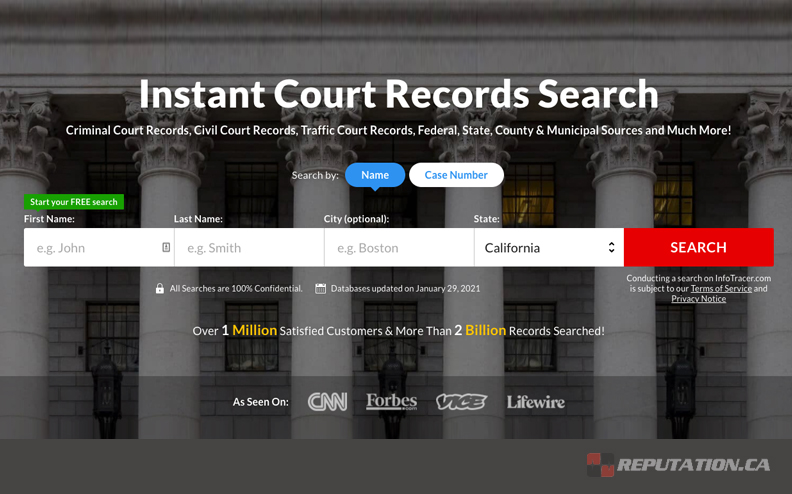
3. The third category is similar to the second category, except they have a little button somewhere saying “click here to remove yourself from our results.” When you click through to their site, you’ll find they usually want a payment to remove the listing, usually in hundreds (or thousands) of dollars. This isn’t going to help you all that much; even if you pay up, and even if they remove the records, it does nothing to handle the first two source categories that we mentioned.
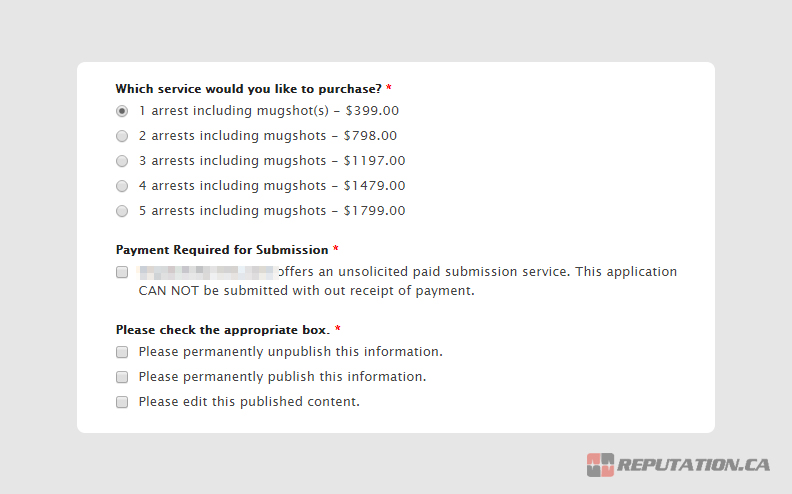
So, going directly to the source and asking to have the legal records removed is generally not going to work. We’re 0 for 2 now in our options, so what about the third one?
3. Getting a Legal Expungement
As we mentioned up above, both of the above methods can work if you do one thing first: getting the records expunged. The expungement process is primarily meant for individuals with wrongful convictions, though occasionally businesses may qualify as well.
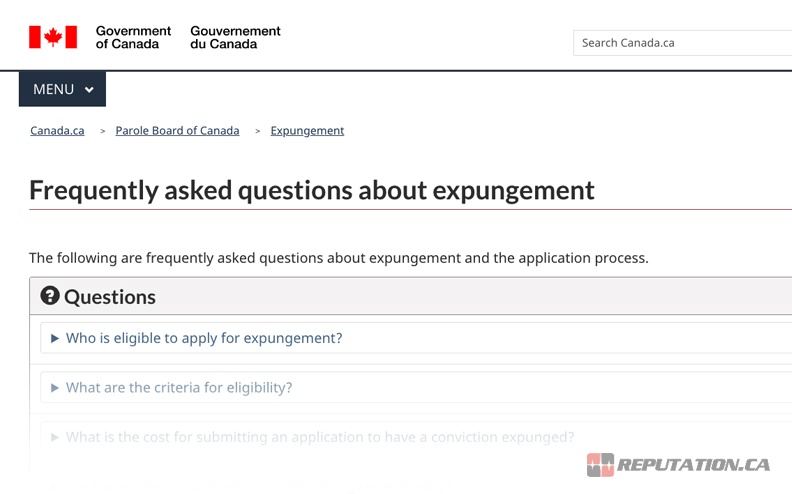
Unfortunately, to follow this process, you need to go through a legal appeals process yourself. That means speaking with an attorney about your case and, if they deem it to have merit, going through the process of filing your request for expungement and hoping the judge rules in your favor. If and only if your records are legally expunged, you can go through the first two processes to have records of them removed from third parties, such as Google or the sites that aggregate court information.
If you don’t qualify for expungement, there’s still one more route you can take.
4. Reputation Management
If you can’t remove the content that is out-ranking you, you’re left with one option: suppress the unwanted results by out-ranking them. Unfortunately, this is a time-consuming and tricky process. You have two ways to go about it, and you should be doing both of them.
1. The first method is to use organic techniques to build your site’s inherent SEO power. Publish blog posts, perform blogger outreach, network with influencers, build up external pages, and work on content marketing. You can do this on your own, or hire a company to handle your blog for you.
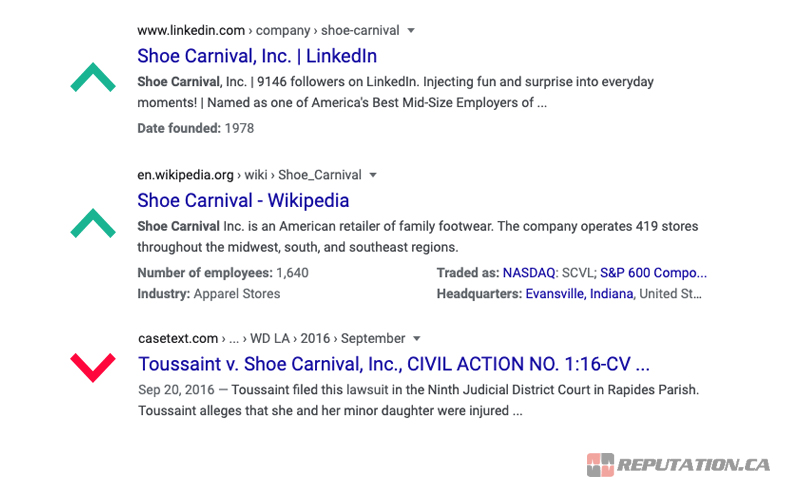
This process takes time. Many businesses spend years building their sites to the point where they rank well for their primary keywords, let alone for fringe keywords related to legal issues. You have to not just rank for those keywords, but out-rank the legal sites hosting them, which have a lot of inherent authority. Reputation companies have dozens of methods they utilize to give some extra fuel to pages that better represent your brand. This brings us to the next option:
2. The second method is to hire a reputation management company. A reputation management company is going to be more aggressive with building your positive reputation, specifically to counteract records of legal issues. They will take whatever ammunition you can give them to contextualize or overwrite the legal records with highly-ranked content.

For example, if your company filed for bankruptcy, a reputation management company might be able to build up your reputation as having successfully dealt with the issues that led to that bankruptcy in the first place. How much better your company is, how you’ve treated your employees correctly, and so on. When someone searches for your company, rather than finding records of you filing for bankruptcy, they’ll see articles about how well you’ve handled it and how the news of your recovery is well-received.
Of course, the worse the legal case, the harder it is to manage. It’s often easier to deal with bankruptcy cases than it is a discrimination suit, for example. Still, reputation management companies can work some serious magic when they’re given leave to do so.
You can do a certain amount of reputation management yourself. Seek out highly-ranked sites that might have cause to mention your business, and strive to get content published on those sites. A combination of outreach, paid sponsorships, user-filed profiles, and other content can help out-rank anything that mentions a legal case you’ve been involved in.
None of this actually removes the legal records, of course. It simply makes it more difficult for the average user who searches for your brand name to find them. Anyone still interested specifically in your legal records and court cases can search for those queries specifically, and will likely find that information if it exists. Many of those people, particularly journalists, for example, can simply go to the legal case sites and find the information directly, bypassing any attempts to hide it.
No single solution is perfect. The best you can do is work on a combination of brand-building and content marketing, and hiring a reputation management firm to handle the heavy lifting for you.
Finally, keep in mind that reputation management isn’t just for businesses. If you have personal legal records that you would like to manage, in most cases, the process is nearly identical.
If you’re concerned about negative mentions, negative SEO, or negative reviews, and you’re curious about what a reputation management company can do for you, feel free to reach out to us for a discussion. A combination of organic growth, blogging, and our services can help virtually any business out of any hole to help build a brighter future for the company.




